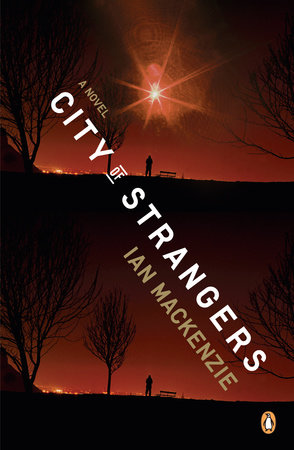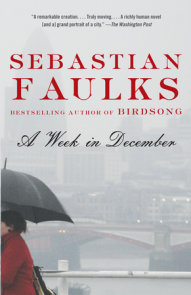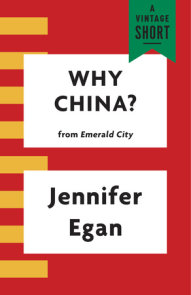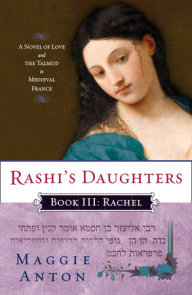READERS GUIDE
Questions and Topics for Discussion
INTRODUCTION
It is a frigid February in 2006. Paul Metzger shuttles between Brooklyn, where he lives, and Manhattan; he has troubles. His ninety-six-year-old father, unconscious in a hospital, lingers near death. Paul’s once promising career as a writer is also on life support. His half brother Ben, a hedge fund manager defending himself against a securities probe, wants little to do with him. He still loves his ex-wife Claire, but she has a new life, climbing the professional ladder as a curator of modern art, and works to keep him at a distance.
In City of Strangers, the brooding debut novel by Ian MacKenzie, characters grapple with loneliness, alienation, and spiritual absence. Consigned to circumstances they never imagined for themselves, they attempt to transform their lives by force of will; such transformations come at a cost, as we soon discover from the experiences of the two brothers, Paul and Ben. From their dying father they inherit a patrimony of guilt and recrimination: as a young man in the 1930s, Frank Metzger swore allegiance to the Third Reich and delivered funds to Hitler’s government. Ben, now approaching sixty, went to extraordinary lengths to disown his father. He changed his surname and converted to Judaism. Paul, more ambivalent about his father’s legacy, stands on the verge of making a Faustian bargain: an offer of a lucrative book deal to write his father’s life story.
The delicate emotional framework of Paul’s life abruptly shatters when he becomes embroiled in a random incident of street violence and one of the perpetrators, wounded in the altercation, begins to stalk him. That man, Terence, appears to have little to lose and is bent on a murky, violent agenda of revenge. Paul’s many anxieties cause him to reflect on the meaning of life; he is as troubled by his atheism as others are by their faith. A man of essentially humane impulses, he must face a reality of emptiness and betrayal. Resolution does not come cheap, and Paul, who couldn’t have imagined such a fate, finds himself in possession of a blood-stained knife and on a dark errand in the Connecticut woods.
At the center of the novel stands the postmodern city: both the city and the idea of the city. It serves as a stage of violence and alienation yet it also represents a crucible in which trust can form in a flash. The characters in City of Strangers must ultimately face their destinies alone, but MacKenzie’s narrative nevertheless forges a tentative claim for the bonds of humanity.
ABOUT IAN MACKENZIE
A native of Boston and a former public high school teacher, Ian MacKenzie graduated from Harvard in 2004. City of Strangersis his first novel.
A CONVERSATION WITH IAN MACKENZIE
Q. New York City has, of course, been the setting of countless novels. What is it about New York City that inspires so many writers? What does that say about its nature?
Well, for one thing, so many writers live in New York. Eventually it’s going to creep into your work whether you want it to or not. There have been countless New York novels, yes, but there is always something new to say. Joseph O’Neill’s Netherland is a good example: he steers the course of what is really a very unusual book through any number of neighborhoods that are not usually featured in New York fiction. I read it last summer, right after turning in the final pages of my own novel, and finished it deeply impressed, not to mention more than a little envious.
New York offers a lot to any writer: a cast of millions, oceans of local history, one of the world’s great dysfunctional subway systems, thousands of bars, forests of architecture. Those elements open countless windows for chance to enter the picture. Chance: so much hinges on chance in fiction—when something unexpected happens it automatically qualifies as a story—and New York has chance in spades.
Q. Paul rides the subway a great deal in the course of the book; his time traveling seems to set up a strong dichotomy between Manhattan and Brooklyn. As a resident of the latter, what are your own feelings about the City That Never Sleeps?
I never had a choice about Brooklyn. I moved to the city with something like $300 in a checking account and a job lined up as a public high school teacher; no one would have given me the lease to a Manhattan apartment in those circumstances. Helpfully, I wanted to live in Brooklyn anyway. It was where writers lived, I was told; it had bars, cafés, concert venues, and interesting people.
For a variety of reasons I have moved around a lot since coming to the city. I have now lived in seven different apartments, both on leases and as a subletter. I have lived in Fort Greene, Park Slope, Williamsburg, Kensington, and Bed-Stuy—an encyclopedia of gentrification, in other words. You notice the gentrification. My first apartment was a sublet in Clinton Hill, a historically African American neighborhood; I was solidly in the minority. That was 2004. The neighborhood had a great, relaxed atmosphere. By the time I moved into a different sublet in the neighborhood, in late 2007, everything had changed. The strollers you see in Park Slope were now everywhere in Fort Greene and Clinton Hill: white people weren’t just moving in, they were reproducing.
Q. In Paul Metzger, you have created a complex character: a person of seemingly decent impulses who nevertheless drinks to excess, fails at marriage, and eventually proves capable of killing a man. Why do you think there is a such a disconnect between Paul’s intentions and the impact he actually has on the world?
I think a schism probably exists between anyone’s intentions and the impact he has on the world. In that respect it doesn’t seem to me a remarkable aspect of Paul’s character—in Paul I simply wanted to furnish the recognizable attributes of a human being; all human beings are complex and contradictory. City of Strangers is not, obviously, a sunny book; Paul was always going to be a tragic figure, not necessarily in the Greek or Shakespearean sense, but in the sense that he can identify the aspects of his life he wishes were different. And once someone recognizes the things in his life he wishes were different, he quite often makes a muck of it trying to repair them.
Q. Several of the main characters of City of Strangers are substantially older than you. How did you go about thinking your way into their thoughts and motivations?
In college, I wrote a novel as my thesis that had as its main character a college-aged man. Since then, I haven’t written much featuring characters who are contemporaneous with my own age, my own stage of life. I can’t really account for this except as a product of having long felt a little older than what I am. I have prematurely graying hair, my knees are lousy. My body seems to be telling me that I’m not really twenty-five, twenty-six, whatever age I am at the moment, that I’d better get ready for back problems.
More seriously, the attraction for me of older characters is their choices: past a certain point, your choices carry more weight—a romance not pursued, a misguided financial undertaking. The time remaining to amend those choices has shrunk. Unjustly or not, in my own mind I affix a certain frivolity to the lives of college students and twentysomethings, and I have little patience for the annual raft of thinly-fictionalized novels about recent college graduates who majored in English and can’t get their own novels published.
So I am drawn to stories about people who are past that point in their lives, who are confronting deeper crises. The possibilities of youth pose crises, surely, but so does the absence of possibility that creeps in with age. But I don’t want to overstate it; there wasn’t a great deal of forward calculation about the plot and characters of City of Strangers—it was a story I needed to write, about people who interested me and who made me care about them.
Q. The issue of terrorism continually arises in City of Strangers. How do you feel that the heightened awareness of terrorism has affected the psyche of New Yorkers and Americans in general?
I’m not qualified to discuss the ways in which terrorism—both the acts of 9/11 and the specter of future acts—has shaped the collective psyche of New Yorkers any more than the next person, and perhaps I am even less qualified. I was living in Massachusetts in 2001 and did not move to Brooklyn until 2004; by the time I arrived, by all accounts, a new concept of prosperity and Babylonian pleasure-seeking had arisen in New York—a Gilded Age. Of course there are allusions to the attacks of 9/11 and the threat of terrorism in City of Strangers; it wouldn’t have seemed realistic otherwise. And thoughts of even worse events do occasionally occur to me, as I’m sure they do to the many who live and work in the city. In my case, at least, they are probably one more symptom of an overactive imagination. That is not to say that the possibility doesn’t exist, only that it isn’t a daily concern and doesn’t intrude in the way that much more ordinary thoughts do. These days you feel the effects of the recession on New York and New Yorkers much more than you feel the threat of terrorism.
Q. Was Frank Metzger, your American Nazi sympathizer, modeled after any historical figures? What was your process for researching this character?
I should begin by saying that City of Strangers is fiction, and that everyone in it is purely fictional. Frank Metzger never existed, and I don’t want to give the impression that I hashed up someone’s life to make Frank. That said, an initial inspiration does exist. In the 1920s and ’30s a man named George Sylvester Viereck had a life that bears some similarities to Frank’s. But there are any number of differences: Viereck was much more prominent; he was born early enough to take an interest in the German cause in World War I as well as World War II; like Frank, he was a budding poet, but one with more success: he was published. I first came across a mention of Viereck in a profile of his son, Peter, in The New Yorker.
Q. Your novel is strongly concerned with faith: who has it, who doesn’t, how it can engender both kindness and fanaticism. How do you see the position of faith in the postmodern world?
I am not religious; my religious views are similar to Paul’s, except that I never had a period of evangelical ardor in my childhood. Nevertheless, faith probably interests me more so than any other human phenomenon, in spite of not having any, or perhaps because of that. In the postmodern world faith likely represents what it always has: a wish for community, a hope against death, a system for living. Religion has always inspired violence, and it has always engendered charitable impulses; it has also always been something which exists within individual people and which is much more complex than we often allow for.
Q. Paul Metzger reminded us a great deal of Meursault, the alienated protagonist of Camus’s The Stranger. What are some of your other creative influences?
The Camus thing is funny: I honestly didn’t have The Stranger in mind while I was writing—although, in a more roundabout way, Camus in general and that book in particular are certainly influences both on my thinking and on my work as a writer—but a number of people have brought up his book as a point of comparison.
I think any discussion of my influences—especially as they concern this particular novel—ought to begin with Ian McEwan. His books have been central in my reading life for the past nine or ten years, and in myriad ways his style has surely influenced mine; in terms of plot, he builds into his novels a clockwork elegance I tried to emulate in my own book, with varying success.
When you write, you consciously and unconsciously assimilate all kinds of influences into your own work, and I can certainly point to Graham Greene, William Styron, J. M. Coetzee, Philip Roth, V. S. Naipaul, James Salter, Jamaica Kincaid, Joan Didion, W. G. Sebald, Tobias Wolff, Nadine Gordimer, and Jhumpa Lahiri as figures whose work has shaped, subtly or not, my sense of what makes a good book, a good paragraph, a good sentence. There are others. Updike, Beckett, Burroughs, Ishiguro, Dostoyevsky, Tolstoy, Baldwin. Poetry, too: Larkin, Stevens, Eliot, Rilke, so many others.
I would be remiss if I didn’t also mention art. Art is everywhere in City of Strangers—most prominently Twombly’s Quattro Stagioni, but also the allusions to Gerhard Richter and Brueghel’s Icarus (which of course Auden got to first)—and art has always been embedded in my fiction. From when I was small, museums were a place of solace and contemplation; my first writer’s rooms were in the Museum of Fine Arts in Boston. The first place I visit in a new city is usually the art museum (sometimes it’s a church, actually), and I still go to the Met or to MOMA or to galleries when I need to work through a problem in my fiction. I take a notebook with me no matter what museum I’m in. They’re uniquely fertile places.
Q. Your novel alludes to the biblical story of Abraham and Isaac. What does this story signify for you, both in the context of religion and as it relates to father-son relationships?
I said earlier that religion is complex, and I think it is. But I also recognize the enormous destructive potential of blind faith—the more so the more zealous that faith becomes. The story of Abraham and Isaac in Genesis, in which God tells Abraham that he must sacrifice his only son (it is worth keeping in mind that Abraham waited nearly a century just to be able to have that son: Isaac was, quite literally, a miracle), and Abraham takes up the knife without apparent hesitation, has always fascinated me more than anything else in the Bible (just as it fascinates Paul). In the Christian era it is considered a prefiguring of the crucifixion—that is, of God “sacrificing” His only son for the sake of mankind. As fiction, it is gripping and incredible; as a set of instructions for living, it is abhorrent.
The story of Abraham and Isaac is a parable about the dangers of blind faith—or the “perils of obedience,” as Stanley Milgram put it. Milgram’s psychological studies, inspired by Nazi officers who claimed they were only following orders, illustrated a fundamental human capacity for deferring to the apparatus of authority—and for allowing that authority to overrule one’s personal ethical order. What better illustration of that than Abraham’s unhesitating willingness to kill his own son?
The zeal with which the religious lionize Abraham for his piety—as do all the “Abrahamic” faiths—Christianity, Judaism, and Islam, with various holidays on the religious calendar to celebrate him—is what troubles me about deep-seated faith: the prizing of a fantasy world that follows death over the tangible, provable world we have here on earth. His act, averted only at the last minute, is called a sacrifice rather than a murder. A father’s first responsibility is to the well-being of his child: that God would command Abraham to vacate that responsibility says a lot about God.
It turns out, of course, that I am hardly the only person troubled by—and obsessed with—the story of Abraham and Isaac. I have come across allusions to it in a number of places, including the films The Believer and The Edge of Heaven, to name just two that come to mind; the filmmakers seem to take a similar attitude toward the biblical episode. (The closing scenes of The Edge of Heaven take place during the Eid al-Adha, the important Islamic festival that celebrates Ibrahim’s willingness to sacrifice his son.) And that isn’t to mention its countless appearances in art: my favorite is Caravaggio’s, at the Uffizi, in which Abraham, troublingly, doesn’t seem all that relieved by the angel’s intervention.
Q. You are a former high school teacher. Are recollections from that experience likely to turn up in your fiction in the future?
I suppose it’s a possibility, but nothing’s in the pipeline at present. Ideas for fiction surface in unexpected places, though, and it wouldn’t surprise me if, ten or twenty years from now, I find myself writing about a teacher. Teaching, as you can imagine, is full of stories. Every day in the classroom is a story.
DISCUSSION QUESTIONS




















